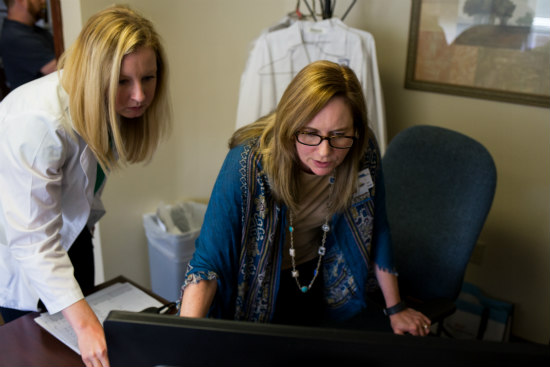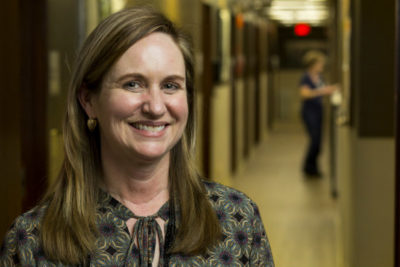3 questions with a pharmacy professor about the opioid crisis and beyond
The research of Maureen Knell, clinical associate professor in the University of Missouri-Kansas City School of Pharmacy, is being cited with greater frequency in the wake of national leaders declaring America’s opioid epidemic a public-health emergency — a designation typically reserved for natural disasters.
The New York Times, The Kansas City Star and Kansas Public Radio have featured Knell and longtime collaborator Rafia Rasu of the University of Kansas School of Pharmacy. For years, they’ve been analyzing data from about 690 million outpatient clinic visits by patients who suffer from chronic pain not related to cancer.
Knell, who received her Pharm.D. from the UMKC School of Pharmacy, joined the UMKC faculty in 1997.

An estimated 2 million Americans are addicted to prescription opioids and there are more annual deaths from overdoses than car crashes. That’s a startling statistic. What surprising patterns have you found in the data?
People 35 to 49 years old were more likely to get an opioid prescription than younger adults — and more likely to get one than those over 65. Maybe physicians have the assumption that they’re safer in middle-aged patients.
Financial factors might be at play, with providers more likely to steer Medicaid patients toward inexpensive generic opioids for pain rather than alternatives like physical therapy or newer brand-name non-opioid painkillers.
Linked to that we found discrepancies in opioid prescribing that seemed to be more cultural than clinical. Poverty and chronic health conditions are higher in the South, which could explain the higher rates of opioid prescription there.
As far as the patterns we saw, we found that opioid use was reported in 14.3 percent of the total patient visits. Fifty-nine percent of these visits reported use of at least one adjuvant pain medication. Adjuvant pain medications are drugs other than opioids, acetaminophen and nonsteroidal anti-inflammatory drugs (NSAIDS), that have been found effective for pain. These include medications typically used for other conditions but have been found to be useful for pain such as certain antidepressants, anticonvulsants, muscle relaxants and even topical treatments.

The New York Times article “Opioids Aren’t the Only Pain Drugs to Fear” recently referenced and linked to your 2013 analysis of data from the National Ambulatory Medical Care Survey. What are examples of NSAIDs, and what’s the issue?
NSAIDs are nonsteroidal anti-inflammatory drugs such as ibuprofen and naproxen. Our analysis showed NSAIDS were used by nearly 95 percent of nearly seven million patient visits reported in the study who took at least one chronic pain medication. They’re safe for most people, but they’re powerful, especially when used at high doses or when used for long periods of time. For people with coronary artery disease, even taken short term, NSAIDs can precipitate clogging vessels. They can cause gastrointestinal problems and sometimes ulcers, bleeding and kidney failure.
What’s up next in your research?
Analyzing newer data. Our last study was based on data from 2000 to 2007, the most recent when we started.
I’m very proud that we worked with a number of UMKC pharmacy students who assisted us with research, analysis and writing. Four out of the five articles we wrote included student-authors, and of course, our future work will include students, too.
UMKC faculty are experts in their fields and gain national attention for their research.
>UMKC researcher contributed to Nobel Prize project
>Could light be the key to fewer needles for diabetics?
>Engineering a better life for older adults

